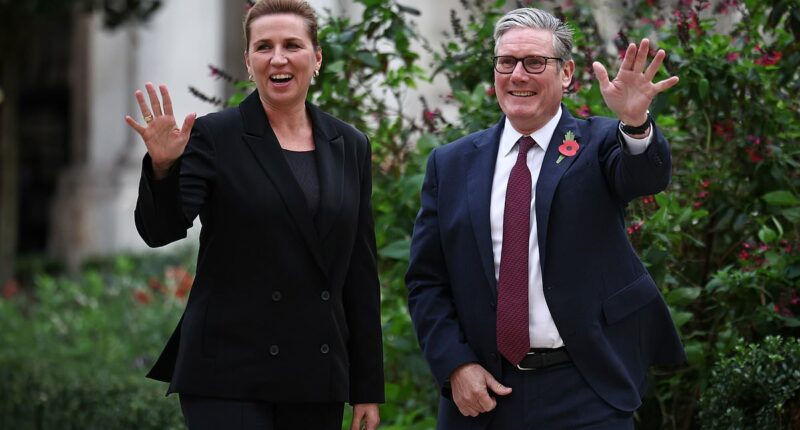Share this @internewscast.com
The Labour Party finds itself in a new wave of internal conflict as members debate whether to embrace Denmark’s stringent immigration policies, all while Keir Starmer faces criticism over the ongoing immigration challenges.
Reports suggest that Home Secretary Shabana Mahmood is examining Denmark’s effective system, which has reduced asylum applications to their lowest in four decades. Officials have reportedly been sent to Copenhagen to study how the centre-left government there accomplished this feat.
However, Mahmood’s initiative has already met with resistance from the party’s left wing, who accuse her of adopting policies associated with the far right.
Nadia Whittome, a key figure in Labour’s Socialist Campaign Group, cautioned against adopting the Danish model, labeling it as ‘undeniably racist.’
In an interview with the BBC, Whittome stated, “These policies would be more suited to the far right than any centre-left government – some of them are undeniably racist policies.”
The MP for Nottingham East highlighted the Danish approach, which links social benefits and residency to stringent criteria, as a ‘dangerous path’ for Labour to consider.
Others in the party take a different view – Gareth Snell, the MP for Stoke-on-Trent Central, said it was worth exploring ‘best practice from its sister parties around the world’ and urged Labour to look at realistic solutions that restore public trust.
The clash reflects a wider divide over Labour’s direction on immigration as small boat arrivals soar and pressure mounts on Sir Keir Starmer to act.
His warning that uncontrolled migration could turn Britain into an ‘island of strangers’ drew fury from the left, but in Denmark, similar arguments have been embraced by politicians across the spectrum and turned into a comprehensive policy that has transformed the country.
Prime Minister Mette Frederiksen, who leads Denmark’s Social Democrats, has made reducing immigration a core promise since taking office in 2019.

UK prime minister Keir Starmer’ and his Danish counterpart in London last month. Starmer’s government is looking to replicate Denmark’s immigration success

Migrants board a small boat into the English Channel in August. Britain has continued to face challenges with mass illegal migration
She declared her aim to pursue a zero refugee policy, discouraging people from seeking asylum unless absolutely necessary.
Her approach of no tolerance for ‘ghettos’, no benefits for those whose asylum has been rejected and people having to pay for their upkeep has been hailed as a winning formula in the country.
The results are striking – asylum applications have fallen by 90 per cent in 10 years, dropping to just 2,333 last year, while the UK figure hit a record 111,100.
Denmark’s system is built on the principle that asylum should be temporary and conditional. People fleeing war are granted refuge only for as long as the conflict lasts.
When their home country is deemed safe, their right to stay is withdrawn, and they must return. Permanent residency takes eight years to obtain and only after steady employment for at least three and a half of the previous four years.
Those who arrive with valuable possessions are expected to help pay for their stay. Under a law passed in 2016, police can confiscate jewellery, watches and other high-value items to offset the cost of housing and food.
Asylum seekers who are refused the right to remain are sent to deportation centres, where they receive three meals a day but no cash benefits.
These camps are run by the Danish Returns Agency, which is funded according to the number of removals it achieves.
The country’s immigration minister told Daily Mail: ‘We stand very hard against giving migrants the right to remain here. If you’re rejected as an asylum seeker, you have a very low possibility of staying in Denmark.’

A Danish police officer walks through a temporary immigraton detention centre in the country
Migrants who agree to go home voluntarily are offered financial incentives of up to £24,000 to help them restart their lives in their home countries. The idea of this is to encourage return rather than entrench dependency.
The government also introduced strict integration rules to ensure that anyone settling in adopts its language and culture.
All newcomers and their children must learn Danish or risk losing asylum benefits.
The country also banned the burka in public places, arguing that full-face coverings hinder integration, and made continued residence dependent on passing citizenship and language tests.
In 2018, the previous government enacted the ‘anti-ghetto law’, which targets neighbourhoods where large numbers of ‘non-Western’ immigrants live in concentrated areas.
The aim is to prevent what ministers describe as ‘parallel societies’ from forming.
The law was updated in 2021 to allow councils to create ‘prevention areas’ where they can refuse to rent to people from outside Denmark, the EU, the EEA, or Switzerland.
Critics call it discriminatory, and the policy is being challenged at the European Court of Justice, but it remains supported across much of the Danish parliament and by a majority of voters.
Family reunification is also heavily restricted – to bring a partner to Denmark, both individuals must be at least 24, financially independent, and have passed Danish language exams.

Denmark has banned the Burkas in public places, arguing that full-face coverings hinder integration
Applicants who have claimed benefits are automatically disqualified. Children can join their parents, but extended relatives cannot.
Officials say the system is designed to prevent sham relationships and to ensure those already in Denmark are settled before family members join them.
It has been reported that the UK does not plan to follow this same method, but will still introduce restrictions.
Transparency is another hallmark of Denmark’s approach – the government publishes crime statistics by nationality, allowing the public to see which groups are most often convicted.
These figures, which showed a rise in gang-related crimes among foreign offenders after 2015, helped build support for tougher policies among Danes.
Although the government does not currently release such data, former Home Secretary Yvette Cooper vowed to do so by the end of the year.
Whenever loopholes appear, Denmark moves quickly to close them. A tenfold spike in student visa applications from two countries last year led to immediate restrictions to prevent abuse.
The says its messaging is clear and consistent – asylum is a temporary refuge, not a back door to permanent settlement.
The country has long supported the sentiment that illegal immigrants should be processed outside Europe. It passed a law in 2021 that allowed claims to be handled in partner countries.
While some European nations have wrestled with rising far-right movements, Denmark’s mainstream parties have largely neutralised them.
The Social Democrats remain the most popular party with nearly 23 per cent support, around ten points ahead of their nearest rivals.

An overhead view of the Sjaelsmark deportation centre for illegal migrants in Denmark. The country’s strict immigration laws has prevented far-right parties from gaining popularity
The Danish People’s Party, once seen as the voice of anti-immigration sentiment, has collapsed to less than five per cent, a decline that politicians credit to the government taking ownership of the issue.
Meanwhile, in the UK, Starmer’s Labour has been pushed to joint third with the Tories, while Nigel Farage’s Reform enjoys the pole position.
The contrast with Britain could hardly be starker – despite repeated pledges to stop small boat crossings, numbers continue to rise, with more than 36,954 people arriving so far this year.
Previous governments’ attempts, including the controversial Rwanda plan, were bogged down by challenges and objections.
Starmer’s attempt to strike a deal with Albania for offshore processing collapsed within hours after Prime Minister Edi Rama publicly rejected the plan.
Denmark, meanwhile, is pursuing a similar idea at the EU level, seeking agreements with ‘third countries’ to host asylum seekers while their claims are assessed.
Supporters of the Danish model argue that it offers a rare example of a humane but effective system strict enough to deter abuse, yet still offering protection to those genuinely in need.
They point to the fact that refugees are sheltered until safe to return, integration is mandatory, and the entire system is transparent and tightly controlled.
Those in favour of Denmark’s policies say the lesson from Copenhagen is both clear and uncomfortable.

The Home Secretary Shabana Mahmood faces a tough task of convincing fellow Labour MPs to back tougher immigration rules
Denmark has proved that a centre-left government can deliver tough immigration control without abandoning compassion, but only if it is willing to endure fierce criticism from its own side.
Mahmood may believe Britain needs to follow that path, yet doing so will mean confronting colleagues who see any restriction as betrayal.
Whether Labour can summon that political courage will determine not just its success on immigration, but its credibility with voters who have heard years of promises and seen little change.
















